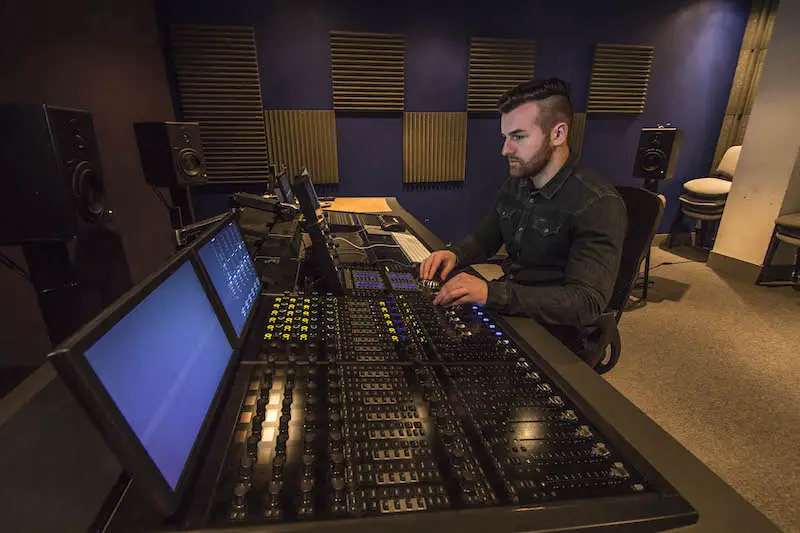
Every professional has a specific set of traits that ensure a great work environment for both the professional and the client. In this article, we will look at the traits one should possess to be a great sound engineer.
1. Patience.
Patience is a virtue that many people don’t possess, and it’s one that is very important. Imagine having to work with someone who is not patient and is constantly reminding you of how bad you are at doing something, or how what you are doing is not good enough, instead of showing you how to do it. This is the worst environment to work in. Sound engineers, usually work in the creative and artistic department, and we all know how creativity needs a lot of patience and attention to detail, or else you will end up messing on something. Sound engineers need to work with many people in order for them to accomplish their tasks. Working with people on a collaborative project needs a lot of patience. Unlike the example I just gave, when working in a collaborative project, you might meet a person who has no work etiquette, and will end up messing the process for you. You will have to be very patient with them to work together. If you meet a sound engineer who is really on top of what he or she is doing, be sure that he or she has a remarkable level of patience and control over his craft and his reaction because artists can be very inconvenient.
2. Good Planner.
Sound engineers always work with lots of clients or artists, as you would like to call them. The thing is they work on a session basis where clients book their sessions and the sound engineer slots them in, at different times. For one to follow through and be on time with all the time slots booked for a day, they must be good planners. They should always be on time, have things set up for different clients requests, make sure that everything needed for a session is ready and set before a session begins, make sure that the studio is clean, have clients songs edited on time, back up all sessions multiple times and also have the amps needed for a session ready for use. It’s a lot of things that happen in a studio, and if you are a sound engineer who is not a good planner, then things will end up overwhelming you. You won’t be able to perform at your absolute best if you are overwhelmed. This is the only trait where you can get the help of someone else. You can get a personal assistant, who will ensure that all these different aspects of sound engineering, are taken care of, as you concentrate on doing your job perfectly.
3. Optimism.
Pessimism has never ever been a good trait for anyone in any job description. No one wants to work with someone who is constantly negative because what that does, is that it draws out the energy and concentration on a particular work project or anything general in life. Imagine how negativity can be so draining in a creative and artistic setup? If you are the person who is always ready to fight or bring up a fight over something tiny and unreasonable, then sound engineering is not your calling. It might not even be about fighting or bringing up a fight but the mere fact that you constantly have nothing good or nice to say to your artists as they record is also a pessimistic trait, that will have artistes running away from your studio. You cannot constantly be saying “That sucks,” “that sounds bad,” “that’s a stupid idea”.. This is the fastest way to have no clients. No one wants to work with someone who is constantly putting them down with their negativity. It is very important to be an optimist when working as a sound engineer, there is nothing good about being a pessimist.
4. Humility.
I say this to everyone, humility will take you far in this life. No one wants to be friends, relate with or even work with someone who is always boastful and a “know it all”. Humble yourself and see how much you can learn from others and how that will impact your life. The reality is that you do not know everything and you will never know everything. There is so much to learn in the world and humbling yourself will have you learning things that you never thought you will know. The most amazing sound engineers are the ones who possess the virtue of humility. They are so willy-nilly and ready to learn from everyone and on anything. You might be strictly into sound engineering, however, humility will have you better your skills in other forms of your art, that you didn’t know about. This will make you a great sort after sound engineer, because of your prowess. Also, how you relate to your clients will ensure they either keep coming back or completely avoid working with you. Be sure to talk to them in a respectful and humble way, and you will secure yourself several loyal clients, who will always come back, every time they need sound engineering services.
5. Keenness.
Being a super-keen person is something that will always work to your benefit, in any environment. You won’t always be fortunate to work with people who will come straight to you and tell you whether they like something or not. As a sound engineer, you will work with very many people from different walks of life and different personalities. The best artists are the ones that will let you know straight up if they are not enjoying their session, or how they sound on a particular recording, as they tend to be outspoken. However, from time to time, you will get artists who are super timid or don’t know how to express themselves. This where being keen as a sound engineer comes in. You will pick up any signs of an artist not being happy with what’s happening, during a session, or when they are not happy with how they sound, therefore, make the appropriate changes. Be sure to pay attention to all your surroundings and how your artists behave, you will be surprised by how much you notice. Be sure to create an environment where the artist can speak up. This is because, once both the artist and the sound engineer are in tune, they end up making magic.
6. Aggression.
I know you might wonder how this is a good trait. By this, I mean that you must be very aggressive in your need to learn new things. The industry is always changing, and you should also be ready to change with it. New ways and techniques of sound engineering come up and if you are not aggressive enough with your will to learn these new techniques, then sound engineering might not be the profession you should be in. New software, are being introduced from left, right and center and you should be able to keep up with all of them. As much as this is a trait that you should possess as a sound engineer, it is important to control it and use it to your benefit. Your aggression should be a hunger for new knowledge and not how you relate with your artists.
7. Diligence.
Diligence is another important trait that you should possess as a sound engineer. Be sure to do everything as expected and be attentive and persistent. This is more important for new sound engineers who are trying to create a profession for themselves. It will not be easy, but with diligence, you will grow in this industry and become a great sound engineer. If you are asked to a specific task, be sure to do it and do it in the best way. Double-check your work, make sure it is error-free. People love working with diligent people and if you have this trait, be sure that you will meet sound engineers who would want to invest in you, and teach you more.
8. Reliability.
A reliable sound engineer is an important part of any studio. A sound engineer who shows up and makes sure that all his or her sessions are done in the best way possible is one that will never go unappreciated. One who delivers on his or her promises without compromising on quality, by finishing projects on the set date and time. Being a reliable person shows that you care, it shows that you take pride in your work and are dependable, which is very important when clients are trusting you, to see their project through and make their vision come to life.
With all these traits, you will make it as a sound engineer. These are not the only traits but they are the most important ones, as they focus on how sound engineers relate to their job and their clients. These are the two main important aspects of any profession.







